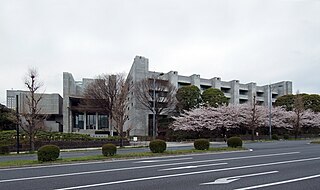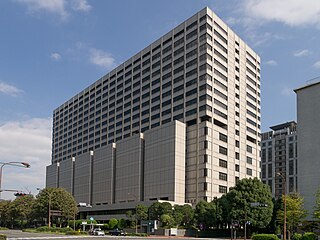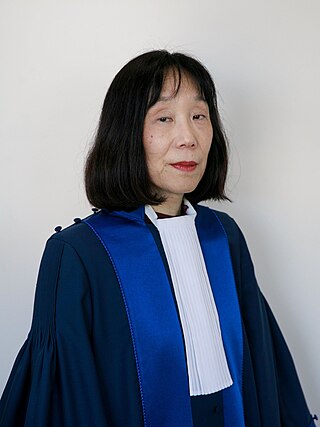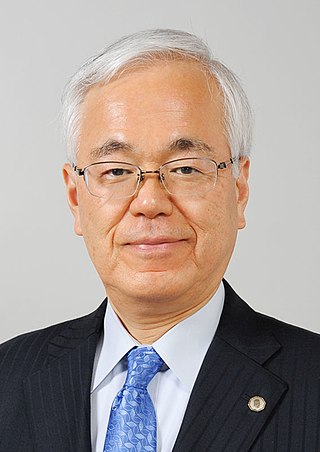Related Research Articles

The Supreme Court of Japan, located in Hayabusachō, Chiyoda, Tokyo, is the highest court in Japan. It has ultimate judicial authority to interpret the Japanese constitution and decide questions of national law. It has the power of judicial review, which allows it to determine the constitutionality of any law or official act.

In the judicial system of Japan, the Constitution of Japan guarantees that "all judges shall be independent in the exercise of their conscience and shall be bound only by this constitution and the Laws". They cannot be removed from the bench "unless judicially declared mentally or physically incompetent to perform official duties", and they cannot be disciplined by executive agencies. Supreme Court judges, however, may be removed by a majority of voters in a referendum that occurs at the first general election following the judge's appointment and every ten years thereafter. The judiciary was far more constrained under the Meiji Constitution than it is under the present Constitution and had no authority over administrative or constitutional law cases. Moreover, the Ministry of Justice had complete and direct control over the courts' administrative affairs. Nonetheless, Professor John Haley argues that the courts maintained complete independence in the adjudication of particular cases. "Judicial independence from the political branches was emphatically established as a fundamental principle of governance in Article 57 of the Meiji Constitution. Of all branches of government only the courts exercised authority 'in the name of the Emperor'." Haley argues that this was and remains a matter of great pride for Japanese judges and notes that "placed prominently in all courtrooms was the inscription 'in the name of the Emperor' as a meaningful reminder to imperial officials and subjects alike that the Emperor's judges were not subject to political control or direction."

Naoto Ōtani is a Japanese jurist and lawyer who served as the 19th Chief Justice of the Supreme Court of Japan from 2018 to 2022.

Tomoko Akane is a Japanese jurist and a current judge at the International Criminal Court (ICC) for Japan.
Atsushi Yamaguchi is a Japanese lawyer and academic who has served as an associate justice of the Supreme Court of Japan since 2017.
Katsuya Uga is a Japanese jurist who has served as an associate justice of the Supreme Court of Japan since 2019.
Hiroyuki Kanno is a Japanese jurist who served as an associate Justice of the Supreme Court of Japan from 2016 to 2022.

Saburo Tokura is a Japanese jurist who has served as the Chief Justice of Japan since June 2022, having previously served as an Associate Justice on the Supreme Court of Japan from 2017 to 2022.
Katsuyuki Kizawa is a Japanese jurist who served as an associate Justice of the Supreme Court of Japan from 2016 to 2021.
Michiharu Hayashi is a Japanese jurist who has served as an associate Justice of the Supreme Court of Japan since 2019.

Yasumasa Nagamine is a Japanese jurist who has served as an associate justice of the Supreme Court of Japan since 2021.
Takuya Miyama is a Japanese jurist who has served as an associate justice of the Supreme Court of Japan since 2018.
Mamoru Miura is a Japanese jurist who has served as an associate Justice of the Supreme Court of Japan since 2018.
Koichi Kusano is a Japanese jurist who has served as an associate justice of the Supreme Court of Japan since 2019.
Kazumi Okamura is a Japanese jurist who has served as an associate justice of the Supreme Court of Japan since 2019.
Ryosuke Yasunami is a Japanese jurist who has served as an associate Justice of the Supreme Court of Japan since 2021.
Akira Ojima is a Japanese jurist who has served as an associate Justice of the Supreme Court of Japan since 2022.
Masaki Ota is a Japanese jurist who has served as an associate Justice of the Supreme Court of Japan since 2021.

Toru Sakai is a Japanese jurist who has served as an associate Justice of the Supreme Court of Japan since 2021.
Eriko Watanabe is a Japanese jurist who has served as an associate Justice of the Supreme Court of Japan since 2021.
References
- 1 2 3 "IKEGAMI Masayuki | 裁判所 - Courts in Japan". www.courts.go.jp. Retrieved 2021-06-10.
- 1 2 "Former Justices | 裁判所 - Courts in Japan". www.courts.go.jp. Retrieved 2022-01-17.
- ↑ "Akihito | Biography, Reign, & Facts". Encyclopedia Britannica. Retrieved 2021-06-10.
- 1 2 "Supreme Court of Japan | Japanese government". Encyclopedia Britannica. Retrieved 2021-06-10.